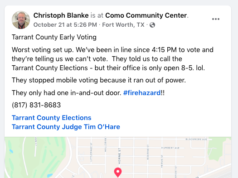After a month and a half on the job as interim editor, Anthony Mariani is now editor. And under his reign of blood, terror, and proper pronoun/antecedent agreement, Mariani promises to retain focus on all of the things you love about the Weekly –– especially its award-winning coverage of the arts and social and environmental justice issues –– while also broadening scope to include notable real estate developments, pro and college sports, and area weirdoes. He also needs help. (No, not that kind of help. Well, yes, that kind of help, but not from you, loyal reader.) He is looking for a proofreader (hours are from 10 a.m. to 9 p.m. or later every Tuesday) and writers (local news, music, and food, most intensely). Prospective proofreaders are encouraged to e-mail their resumés to anthony.mariani@fwweekly.com. Writers? E-mail your story ideas (three minimum) and, if possible, links to published pieces.
Hey, Abbott. Where’s Costello?
Has it been written somewhere in the oath of office that the Texas governor must promise to become a national joke? Former governors George W. Bush and Rick Perry seemed halfway normal while in Texas. As soon as they ventured beyond the state line, however, they turned bat-poop crazy.
Gov. Greg Abbott is an overachiever. He’s barely even warmed up his chair in the governor’s mansion, and yet he’s already shown the rest of the country that he can be just as moronic. When the United States military came to Texas for training exercises last week, Abbott told the Texas State Guard to keep an eye on them. After all, those darned feds might try to pull a fast one and take our guns, steal our women, and eat our young. Internet fiction writers –– er, conspiracy theorists –– figured the feds were actually planning to invade Texas.
“It is important that Texans know their safety, constitutional rights, private property rights, and civil liberties will not be infringed upon,” Abbott said in a statement.
It’s also important that Texans knows their governor isn’t such a paranoid wingnut that he would suspect President Obama of invading Texas and enacting martial law.
New Leadership, Same Challenges
Otis Thornton, the new director of the federally funded Tarrant County Homeless Coalition, is optimistic about bridging the gap between the homeless and the city transportation authority, a.k.a. The T.
Last year, The T announced it would cut $300,000 in funding from a program that provides free bus passes to local nonprofit groups that disseminate the passes to local homeless folks, allowing them to reach work or job interviews. Thornton is confident he can get The T “back to the table” for negotiations, he said, noting that as a former member of the city’s Advisory Commission on Ending Homelessness, he has worked with the transportation authority in the past. Part of that negotiation process, he said, means that homeless advocates must participate in The T’s ongoing master plan for the city.
“That seems fair,” Thornton said. “Homeless or housed, we all benefit from a strong transportation system.”
For years, Fort Worth officials have tried to deal with the city’s homeless population, waffling over whether to clump the homeless and their various support services in one spot on East Lancaster Avenue or disperse them across the city. No matter where the homeless end up, somebody’s going to complain. But at least the city is trying to address the problem.
“If the goodwill and compassion of charities and congregations were all it took to end homelessness, this town would have done so long ago,” Thornton said.
The overall homeless population in Fort Worth is still growing, although the ranks of the chronically homeless have begun to shrink. Residents in and around the East Lancaster area are frustrated and increasingly vocal about the homeless population that isn’t going away.
Thornton has been among the city’s most outspoken proponents of a controversial approach to ending homelessness called Housing First. Rather than setting benchmarks for an individual to meet before giving him or her access to public housing, such as completing drug rehab and holding down a job for a set amount of time, he or she receives housing as quickly as possible and then receives access to support services. Thornton said the model worked during his time with the city, but the funding levels lagged far behind what he asked for.
“Homelessness is hard for elected officials, especially at the local level,” he said. “It’s a costly problem that everyone wishes would go away. We have local data that shows it costs less when people are housed. I hope local officials will continue to rally around the proven strategies like permanent supportive housing.”
Lower Education
Directors at Corinthian College must have felt the Golden Rule didn’t apply to them. Corinthian CEO Jack Massimino and other executives collected millions in perks last year while tens of thousands of students at their campuses accumulated debt and few job prospects.
Last week, the Santa Ana, Calif.-based college announced it was closing and selling off the remaining 28 campuses it managed in California. As recently as last June, the for-profit college had four branches in Fort Worth under the name Everest College. Things began unraveling in 2014 when a report by the U.S. Department of Education said Corinthian had misled students by inflating job placement rates. Seems some employees were paying temporary employment agencies to hire graduates for short-term work and then recording the temp work as successful placement in careers.
That finding, plus evidence of altered grades and attendance records, led the feds to fine Corinthian $30 million. Frequent Weekly contributor Steve Miller found similar problems with Corinthian’s Everest campuses (“A Degree in Debt,” Aug. 13,. 2014). In that piece, he profiled 28-year-old Camerion Savage, who accumulated $17,000 in debt after graduating with a degree in business administration. After Everest staff promised to place him in a business-related field, the Tarrant County campus low-balled him with offerings at McDonald’s, Denny’s, and Home Depot.
“Overall, our schools did a good job for the students they served,” Massimino said in a public statement. “We believe that we have attempted to do everything within our power to provide a quality education and an opportunity for a better future for our students.”
Golly, with that kind of PR skill, there may be a job waiting for Massimino at Chesapeake Energy.
They Really Like Us!
Two feature stories about how energy companies fell short on their promises of gas royalties were honored at last month’s 12th Annual Society of Professional Journalists First Amendment Awards and Scholarship Dinner in Arlington. Staff writers Jeff Prince and Eric Griffey co-authored a story that won first place in the General News category (“Shale Math: Half Full or Half Empty?” Dec. 3, 2014). The judges noted that the writers “put considerable effort into research” and remarked how “this is the sort of article that deserves to win in part because of the attention it will draw to a very important issue.”
Staff writer Peter Gorman won first place in the Opening the Books category. In “Royalty Rip-off” (April 16, 2014), he showed how landowners were suing drillers who took secretive deductions from royalty checks. Judges lauded Gorman for shedding light on “a poorly understood practice with widespread implications” and described the story as “strong explanatory journalism.”
Gorman also won third place in the Defending the Disadvantaged category for his story on Texas’ tough truancy law (“Late to Class? Off to Court!” Jan. 22, 2014). In the Reporting on Open Government category, Griffey and former intern Kenneth Kost took second place with their look at political turmoil in Dalworthington Gardens (“Drying Up in DWG,” July 9, 2014). Griffey took third in that category as well with a story about a lawsuit against the school district (“Laundry Day,” April 30, 2014)












